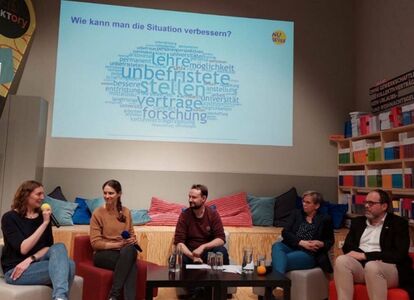BL13-News 05/25
Information by the University Union
The turn of the year was marked by government negotiations at the federal level, which ultimately brought a few surprises. Eva-Maria Holzleitner is Federal Minister for Women, Science, and Research since March. We are eager to see whether new impulses will be given to science and research.
In this issue, we share our initial assessment of the government program. There is also a review of the discussion event “Working in Science – Creating Perspectives” held at the FAKTory in Vienna in early April, as well as an outlook on the upcoming senate and works council elections at many universities.
The BL13 editorial team welcomes suggestions for topics and further feedback. Simply send an e-mail to redaktion.bl13symbolgoedpunktat.
Panel discussion: Working in science - creating perspectives
Review of the event at FAKTory Vienna

On 3 April 2025, the FAKtory hosted the dialogue event "Creating perspectives: Working in science - ways out of the precariat" took place at FAKtory on 3 April 2025. With around 70 participants on site and another 70 viewers online, the event was very well attended. The panel lists Maria John, Vera Pfanzagl, Mario Keller (moderator), Gerda Müller and Wolfgang Kozak. They discussed how the situation could be improved.
The event was characterised by open and critical contributions. Julia Partheymüller kicked off the event by presenting the NUWiss study on the employment situation at Austrian universities. The study, which was conducted in 2023, shows that the majority of employees do not have access to long-term employment contracts or predictable career paths. This leads to uncertainties that put a strain on the entire academic system.
This situation has already been diagnosed several times. If we consider the dimensions of this, it is sobering to realise that almost 80% of the approximately 45,000 academic and artistic staff at Austria's universities are affected by fixed-term contracts. At the beginning, representatives of this disadvantaged absolute majority will speak: Maria John (PhD student, BOKU) and Vera Pfanzagl (Elise Richter Network, BOKU) illustrate how the current lack of prospects and the lack of attractiveness of universities as employers affect their work and their lives as scientists: uncertainties regarding family planning or the integration of stays abroad. They must always keep an eye on deadlines that affect extension options.
Gerda Müller, who as Vice-Rector of the MDW is responsible for personnel issues and is also Chair of the Federation of Universities (Dachverband), emphasised the challenges in financing and pleaded for more transparency, particularly with regard to Section 109 of the Universities Act (UG) and the criteria for potential permanent appointments. She emphasised the need for a special employment law with extended fixed-term options, as there is also a human dimension that should not be underestimated, which is associated with dismissals primarily for budgetary reasons.
AK labour law expert Wolfgang Kozak also emphasises this special labour law and the complexity of §109 UG. He emphasises that the current regulations allow for different interpretations. This leads to confusion and uncertainty for both affected employees and legal advice centres.
The discussion was largely harmonic. One controversial point concerned the culture of labour law at universities. It was pointed out that a change towards an employment culture is necessary in order to create long-term prospects for academic and artistic staff and the university. This applies in particular to dealing with the growing group of employees financed by third-party funding. This group is almost exclusively employed on a fixed-term basis. Only very few locations have a comprehensive personnel policy for this group. The ‘automatism’ associated with this fixed-term practice leads to a constant replacement of employees every few years. This means maximum flexibility for university management and at the same time maximum planning uncertainty for those affected - and this brings us full circle to the initial statements made by those affected. The discussion has once again shown that those affected see themselves as the losers of the current academic system and, as “labour entrepreneurs” (a specific type of individual entrepreneur shaped by Hans J. Pongratz), i.e. ascribe themselves a weak position in the overall structure.
As trade unionists we are called to continue the dialogue with university management representatives as well as political representatives in order to develop sustainable solutions, together.
This event was organised in cooperation with the Vienna Chamber of Labour and ÖGB Verlag. A recording of the event can be found at https://www.youtube.com/live/gWepdKlMtp4.
New government programme
A first assessment

The government negotiations kept us on our toes at the turn of the year. The coalition of ÖVP, SPÖ, and Neos has been in place since March and the current government programme addresses innovation and research as well as the importance of science in several places. We took a closer look at the passages on research (pp. 39, pp. 175-179) and science (pp. 193-197): an initial assessment below.
What is essential for achieving good working conditions and, consequently, good science?
Public universities are the most important institutions in Austria's tertiary education sector. They have a key function in terms of training future scientists, highly qualified specialists and teachers. They are among the most important scientific institutions in Austria. Public universities cover a wide range of research areas and disciplines. Especially in the area of fundamental research, they are vital to Austria as a centre of research. In our view, these premises should be emphasised more clearly than they have been to date.
The government programme includes a commitment to inflation compensation for outsourced institutions (p. 199). We see this as a very positive impulse. In our view, however, it should be made clear that this inflation compensation also applies to the allocations for universities in the coming performance agreement periods 2025-2027 and beyond.
Despite the difficult budgetary situation of the federal government, i.e. of Austria, we believe it is crucial for securing Austria as a centre of science and arts to achieve a significant increase in the basic funding of universities, which will be more closely controlled by the science ministry. This control could be linked to
- a gradual reduction in fixed-term employment contracts until a quota of around two thirds of permanent academic staff has been reached;
- a mandatory development of complete personnel structure plans by the rectorates;
- a mandatory offer of qualification agreements for all postdocs and, once these have been reached, a permanent employment;
- a family-friendly and sustainable employment policy to prevent structural discrimination and ensure a balanced relationship between fluctuation and continuity within the staff;
- market-compliant pay for general staff in order to prevent high staff turnover among specialists.
There is a commitment to increasing the research quota to over 4% of GDP (p. 39). These funds are not only to be granted in the area of applied projects by commercial enterprises, but care must also be taken to ensure that funds are also channelled into the expansion of third-party funding for research at universities, whereby a balanced relationship with basic funding must be ensured.
The majority of lecturers and researchers at universities are confronted with a high degree of professional insecurity and precariousness. Around three quarters of academic staff at Austrian universities have exclusively fixed-term contracts with negative effects on their private and family lives. The reasons for this lie in the lack of basic financial resources at universities, the one-sided perspective of academic career paths and a labour law situation that does not reflect the realities of life at universities. Although ‘university autonomy’ has given university management more room for manoeuvre in terms of content, it has also led to an increase in precarious employment relationships. This was made possible by numerous special regulations in the UG, in particular the exceptions to general labour law regulated in §109. The UG has been amended numerous times since 2004. The 2021 amendment in particular has been heavily criticised to this day due to the tightening of the fixed-term situation as a result of the newly formulated § 109.
The government programme (p. 194) points out that universities should become or remain attractive employers. In order to achieve this goal, the regulations in § 109 UG (university act) and the collective agreement must be formulated in such a way that they create a balance between job security and a performance-orientated focus in the academic world. The preparation of these adjustments should be accompanied by a dialogue process involving affected groups and stakeholders (especially the trade union!) in order to discuss a fundamental revision of the UG, especially with regard to the labour law framework and Section 109. It would be particularly exciting if it were possible to initiate a kind of future laboratory or ‘science dialogue’ as a participatory process to discuss and develop concrete proposals for the redesign and reorganisation of the academic world.
Thanks to free access to higher education and the provision of socially relevant knowledge, they also have the potential to have a strong impact on society. Probably the most important unique selling point of universities is the legally enshrined link between research and teaching, i.e. the active integration of current research into teaching and the feedback of students' questions and perspectives into research. Many of the current challenges and problems at universities are rooted in the strongly hierarchical and undemocratic basic structure defined by the UG02. Although democratically elected bodies such as university senates and works councils exist, they have little real influence on university policy decisions. On the part of university management, decisions are often made with little transparency and based on a strong top-down logic. This corresponds neither to a diverse academic landscape nor to the ideal of an ‘autonomous’, self-governing university. In addition to the university management, professors in particular have a disproportionate amount of influence in the university structure. They have de facto absolute majorities in all university committees, while the large number of academic staff and students have little say:
- Creation of new forms of participation that guarantee one-third parity (professors - “mid-level staff” - students) and enable participation in decision-making processes such as the definition of socially relevant knowledge, strategic orientations, personnel decisions and much more;
- Strengthening democratic structures within the university in the sense of practising university autonomy (e.g. giving works councils more say in the university council);
- Creating incentives for the establishment of cooperative faculty models and the de-hierarchisation of faculty and institute structures
The coming weeks and months will show how the new Federal Minister Eva-Maria Holzleitner and her team succeed in implementing the plans set out in the government programme.
The new UG reform planned for spring is already a litmus test for the direction the team in the Ministry of Science will take and whether it will succeed in implementing the motto of the government programme ‘Doing the right thing now’.
(Angelika.Schmidtsymbolmy.goedpunktat will be happy to answer any questions you may have regarding the content).
Interested in co-determination?
Then register for senate or works council elections and exercise your right to vote!

This year, elections will be held at many campuses in early summer and autumn. Senate elections will be held at many locations before the summer. In autumn and early 2026, works council elections will be held at many locations. Both elections offer the opportunity to participate in decision-making processes.
Together with the University Council and the Rectorate, the Senate forms the top management level of the university. It is therefore an important player in the university's internal realisation of the idea of checks and balances in decisions of long-term importance. It has important rights of participation in the organisational and development planning of the university. The term of office for this committee is defined in the UG and is three years.
The works council is the legal representation for the very heterogeneous workforce of employees in the academic and artistic field. The group to be represented ranges from professors with full-time positions to part-time lecturers with sometimes only one-semester contracts and employment for a few hours per week. The aim is to represent this diversity comprehensively and to actively represent and support the weaker, marginalised groups. Works council committees therefore have a variety of focal points. The term of office of the works council is five years.
The basic maxim of the work of these groups is to ensure good working conditions, a high degree of freedom and diversity in research, teaching, and development of the arts, as well as a high level of protection of labour and of personal data.
If you are interested in participating in the university's decision-making processes as part of this co-determination programme, now is the right time. Register to stand as a candidate for the Senate or the Works Council. Of course, don't forget to take part in the respective elections.
Your participation and your vote matter!